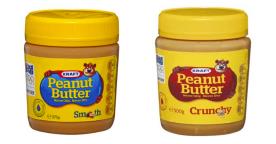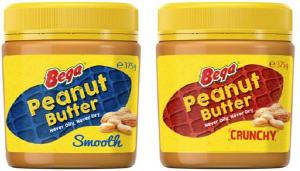On 15 April 2020, the Full Federal Court dismissed an appeal against O’Callaghan J’s decision in Kraft Foods Group Brands LLC v Bega Cheese Limited (No 8) [2019] FCA 593. Importantly, this decision confirms that unregistered trade marks cannot be assigned without a sale of the underlying business which holds the related goodwill.
The appeal concerned ownership of an unregistered trade mark comprising the get-up or appearance of peanut butter packaging. This lucrative packaging is described in the judgment as the Peanut Butter Trade Dress:
‘a jar with a yellow lid and a yellow label with a blue or red peanut device, with the jar having a brown appearance when filled.’
You may recognise the Peanut Butter Trade Dress in flashbacks of your childhood (or adulthood) pantry:

Image source: Kraft Foods Group Brands LLC v Bega Cheese Ltd [2020] FCAFC 65.
Background
‘Kraft Peanut Butter’ has been available for purchase in Australia since 1935. Kraft Foods Limited was the Australian subsidiary of Kraft Foods Inc. Prior to 2012, Kraft Foods Limited manufactured and sold KRAFT branded peanut butter products using the Peanut Butter Trade Dress.
A restructure in 2012 (Restructure) resulted in Kraft Foods Inc splitting its business in two:
- Global snacks business – run by Mondelez International Inc; and
- North American grocery business – run by Kraft Foods Group Inc.
Following the Restructure, Kraft Foods Limited changed its name to Mondelez Australia (Foods) Limited (MAFL) and continued to manufacture and sell KRAFT branded peanut butter in Australia using the Peanut Butter Trade Dress.
In July 2015, Kraft Foods Group Inc merged with H.J. Heinz Company to form the Kraft Heinz Company. H.J Heinz Company Australia Limited (Heinz Australia) is the Australian subsidiary of the Kraft Heinz Company. In April 2018, Heinz Australia began manufacturing and selling small quantities of KRAFT branded peanut butter in Australia using the Peanut Butter Trade Dress.
This complicated structure is enough to make you go nuts. To assist I have prepared a diagram below:
The nutty saga really began in 2017 when Australian company, Bega Cheese Limited (Bega) acquired the peanut butter business and related assets of MAFL. Post-acquisition, Bega began selling Bega-branded peanut butter using the Peanut Butter Trade Dress:

Image source: Kraft Foods Group Brands LLC v Bega Cheese Ltd [2020] FCAFC 65.
As a result of Bega’s product, Australian supermarkets declined to stock the new Kraft peanut butter manufactured by Heinz Australia due to the risk of consumer confusion. Heinz Australia and Kraft Food Group Brands LLC (together, Kraft) went on to sue Bega over its use of the Peanut Butter Trade Dress.
During the trial both Kraft and Bega claimed they were entitled to use the Peanut Butter Trade Dress. Kraft relied on causes of action based on contract, passing off and misleading or deceptive conduct under the Australian Consumer Law (based on a number of Bega’s advertisements). Bega cross-claimed against Kraft claiming that a press release published in October 2017 which used the slogan ‘Loved since 1935’ was misleading or deceptive.
Things did not go smoothly for Kraft. At first instance, the trial judge concluded that Bega was entitled to use the Peanut Butter Trade Dress as a result of its acquisition of the MAFL peanut butter business in 2017. In particular, his Honour found that the goodwill generated in respect of Kraft branded product bearing the Peanut Butter Trade Dress inured to MAFL, and that those rights were validly sold to Bega in 2017. His Honour also found that Kraft engaged in misleading or deceptive conduct through its use of ‘Loved since 1935’ because this phrase created an association with Bega’s peanut butter product, which had been produced continuously since 1935 (whereas Kraft’s peanut butter product launched in 2018).
Crunch time at the appeal
Kraft appealed the first instance decision on a number of grounds. Kraft’s main submission was that the Restructure documents were incorrectly construed and the rights in the Peanut Butter Trade Dress were never properly assigned to Bega. In doing so, Kraft relied on a Master Trademark Agreement (MTA) executed during the Restructure, which purported to assign the rights in the Peanut Butter Trade Dress (an unregistered trade mark) from MAFL (i.e. the global snack business) to Kraft Food Group Brands LLC (i.e. the American grocery business). Agreements that purport to assign trade dress rights are common in the United States.
The Full Court unanimously dismissed Kraft’s appeal, holding that the Restructure documents showed the Peanut Butter Trade Dress was allocated to the global snacks business and not to the North American grocery business. Specifically, the Full Court held that rights in the Peanut Butter Trade Dress were not assigned by the MTA because an unregistered trade mark may only be assigned by way of an assignment of the goodwill of the underlying business. Accordingly, the assignment in the MTA was ineffective as a matter of Australian law.
The Full Court also dismissed Kraft’s appeal grounds related to Bega’s alleged misleading or deceptive conduct and Bega’s successful cross-claim.
Spreading the lessons from the appeal judgment
As part of their judgment, their Honours confirmed that under Australia law, an unregistered trade mark may only be assigned by way of an assignment of the goodwill in the underlying business.
In this case, the Restructure documents did not allocate the Peanut Butter Trade Dress rights to the North American grocery business run by Kraft Foods Group Inc. Accordingly, the rights remained with MAFL upon the Restructure.
When Bega subsequently acquired the peanut butter business from MAFL, it acquired all assets and other goodwill comprising the peanut butter business in Australia, including the rights to the Peanut Butter Trade Dress. Even though Bega only acquired part of MAFL’s business, that part of the business was relevant to the Peanut Butter Trade Dress.
Moving forward, businesses, especially those in the FMCG space, should take note of the following key lessons from the judgment:
- Smooth over any bumps in IP licensing arrangements, especially between companies within corporate groups. Make sure all licenses clearly state ownership and the scope of each parties’ rights to use the intellectual property.
- Avoid a jarring experience by registering all important product and packaging ‘get-up’ as trade marks in the name of the correct corporate entity.
- When it comes to selling parts of your business, make sure you go a little nutty over the paperwork. Ensure that the transaction documents clearly set out which intellectual property rights will be sold with the business.
Featured image: PiccoloNamek at English Wikipedia, CC BY-SA 3.0, Wikimedia Commons.








